Busso / Walvekar Labs
Led by Dr. Rohan Walvekar and Dr. Carlos Busso, the Busso/Walvekar labs consist of three distinct laboratories located in the Department of Otolaryngology (ENT) in the Mervin L. Trail, MD Clinical Sciences Research Building.
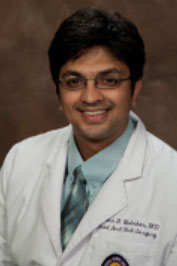
Dr. Rohan Walvekar
Professor
Rohan R. Walvekar, MD, earned his doctoral degree from the University of Mumbai. After graduating in 1998, he completed a residency in Otolaryngology and Head Neck Surgery at the TN Medical College & BYL Nair Charitable Hospital, Mumbai, India, with triple honors. Subsequently, he completed two head neck surgery fellowships and trained at the Tata Memorial Hospital, Mumbai, which is India's most prestigious cancer institute, catering to over 5000 new head neck cancer registrations a year. After completing an Advanced Head & Neck Oncologic Surgery fellowship at the University of Pittsburgh, he became an Assistant Professor in Head & Neck Surgery within the Department of Otolaryngology-Head & Neck Surgery at the University of Pittsburgh/VA Medical Center, prior to joining the LSU Health Sciences Center in July 2008. His clinical interests are head neck surgery and salivary endoscopy. His research interests include evaluating prognostic markers and clinical outcomes of head and neck surgery and treatment of salivary gland disorders.
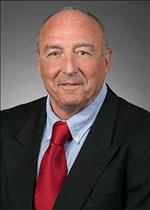
Dr. Carlos Busso
Research Associate
Dr. Busso joined the faculty of the Department of Otolaryngology - Head & Neck Surgery, Louisiana State University Health Science Center in June 2005 as a Research Associate. For the last twenty plus years his research interest has been focused on understanding the mechanisms of maladies like Neurofibromatosis and Vestibular Schannomas, the origins of formation of bodily concretions like kidney, thyroids, bladder and particularly salivary stone (Sialolithiasis). His primary approach on these research areas has been using Statistics, Biochemistry and Molecular Genetics tools, including, applied Nucleic Acids Chemistry, Genomics and Bioinformatics, Metabolomics and Proteomics. In addition, the last four years he has also expanded his research working in medical instrumentation supporting the objectives of the Department of Otolaryngology - Head & Neck Surgery. His current collaborations are to develop an instrument to evaluate the chemical composition of salivary stones (important for surgical procedural decisions) and in situ stone dissolution instruments.
Additionally, due to the SARS-CoV-2 (Covid-19) pandemic creating emergent unexpected deficiencies needing urgent solutions his research interests focus on the wellbeing of the community. Specifically, one research project included the development of a novel and accurate point of collection method for detecting Coronavirus.
About the Labs
The B/W laboratories are located in the Department of Otolaryngology (ENT) in the Clinical Sciences Research Building (labs 551-555-556). The B/W research facilities consist of three distinct labs. A Bio-Molecular lab (556) which has four operational benches with full molecular research instrumental (Spectrometer, Protein and Nucleic acid Electrophoresis systems including membrane transfer equipment, PCR, water baths, rockers machines, pipettes (mechanical and electrical), bench centrifuges, and two -20 C° Freezers).
The 555 lab has, two 4 C°, one -20 C° Freezers, one -80 C° Ultra-freezer and a small electronic development section. Regarding the small electronics section in the 555 lab, it is a workshop station prepared for the development of analog and digital devices. The laboratory includes assorted pre-amplifiers, tunable active filters, audio monitors, forced air oven, micropipette puller, and accelerometer with a wireless transmitter, multiple oscilloscopes, high vacuum pumps, chambers, and a drill press.
The 551 lab is a complete two-bench Cell Culture lab. It has one Level II Safety Hood, two CO2 Incubators, Sonicator, Electroporation instrument, Hypoxia Chamber, and dedicated floor and bench Centrifuges, liquid nitrogen tanks, and safety showers. In addition, the ENT department counts with a six-bench Temporal Bone Lab. This facility is principally used for resident practice and clinical research.
The ENT department also has access to share instrumentation facilities, like Ultracentrifuges, and high-speed Centrifuges, Photo Image Documentation, and Bio-Rad Chemidoc, Nano Drop, RT-PCR (C1000 Bio-Rad), etc. IT capabilities, libraries, controlled substance security, and other institutional support are available.
Busso / Walvekar Lab Research Highlights
Parotitis and Sialendoscopy of the Parotid Gland
Nonneoplastic disorders of the salivary glands involve inflammatory processes. These disorders have been managed conservatively with antibiotics, warm compresses, massage, sialogogues, and adequate hydration. Up to 40% of patients may have an inadequate response or persistent symptoms. When conservative techniques fail, the next step is operative intervention. Sialendoscopy offers a minimally invasive option for the diagnosis and management of chronic inflammatory disorders of the salivary glands and offers the option of gland and function preservation. In this article, we review some of the more common nonneoplastic disorders of the parotid gland, indications for diagnostic and interventional sialendoscopy, and operative techniques.
Read More at the National Library of Medicine
A Comprehensive Analysis of Sialolith Proteins and the Clinical Implications
Head and neck cancer and its treatment frequently adversely affects swallowing function. Our research team is working to improve swallowing function in patients with head and neck cancer. We employ behavioral treatment protocols with varying intensity and frequency to minimize treatment toxicity and maximize the maintenance of safe swallowing. Using these techniques, we have shown a 50 % reduction in feeding tube dependence. We continue to work on strategies to maximize these benefits with studies underway to determine the significance of the objective timing and displacement measures of swallowing and diet outcomes.
Selected Publications
- Busso CS, Guidry JJ, Gonzalez JJ, Zorba V, Son LS, Winsauer PJ, Walvekar RR. A Comprehensive Analysis of Sialolith Proteins and the Clinical Implications. Clin Proteomics. 2020 Mar 31;17:12. doi: 10.1186/s12014-020-09275-w. eCollection 2020.
Read More at the National Library of Medicine
Busso / Walvekar Lab Photos
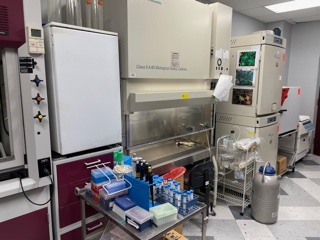 |
|
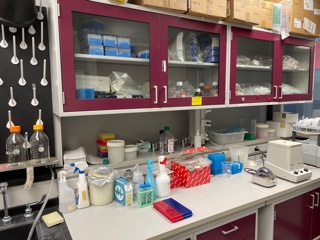 |
|
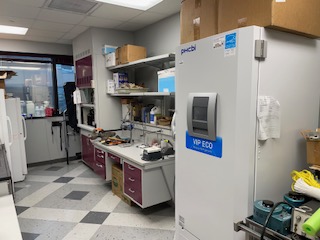 |
|
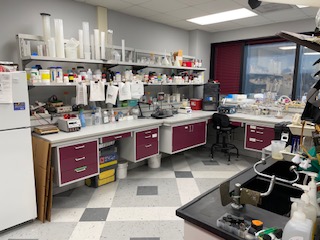 |
|
